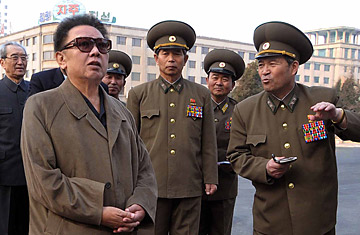
North Korean leader Kim Jong Il
The long-range missile that North Korea launched Sunday morning eventually fell harmlessly into the Pacific Ocean, carrying with it a communications satellite that it had intended to deploy in orbit. In typical fashion, the North Korean government today lied about the satellite plunge. Its central news agency informed the citizenry that the satellite was already beaming back into North Korea "immortal revolutionary paeans to General Kim Il Sung'' — the country's founder — "and his son, General Kim Jong Il."
The truth is, Kim Jong Il and the regime he heads can live without subjecting North Koreans to revolutionary ditties from space. Yesterday's launch, from the North's standpoint, was an almost unequivocal success, even if the satellite now sleeps with the fishes. Diplomatic and intelligence sources in Seoul and Tokyo contend that Pyongyang's biggest aim was to increase the range of its Taepodong II rocket. In 1998 it launched a predecessor that traveled about 1,060 miles (1,700 km). On July 4, 2006, another long-range rocket broke apart shortly after launch. Yesterday's rocket flew more than 2,175 miles (3,500 km) — about twice the distance of the '98 launch. "That was the government's basic goal," an East Asian intelligence official says. "To increase the range of the Taepodong II. This was a test of an intercontinental ballistic missile thinly disguised as a rocket carrying a satellite. From a military standpoint, the test is a success, not a failure." (See pictures of the rise of Kim.)
It was also a diplomatic success because it has — for the moment anyway — tied the Obama Administration in knots. The White House's aim — publicly voiced last week by Stephen Bosworth, President Obama's special envoy for North Korea — has been to re-energize the so-called six-party talks that focus on North Korean denuclearization, and even to engage the North directly. Bosworth was quoted as saying that will still be the case "after the dust from the missiles settles."
In the meantime, the U.N. Security Council — at the behest of the U.S. and its key allies in East Asia, Japan and South Korea — convened yesterday to consider a response to the launch. But the meeting broke up late Sunday night with no agreement on anything, and that speaks volumes about the gap that now exists between China and Russia on one side (both permanent members of the Security Council) and the U.S., South Korea and Japan on the other. (Those nations, plus North Korea, comprise the six-party talks.) (Read about what North Korea could look like after Kim.)
China's reaction to the launch was almost nonchalant, as if its diplomats couldn't be roused to work on a pleasant spring Sunday. In effect, Beijing said, Let's move along, folks — nothing to see here. The Foreign Ministry, in fact, issued a statement calling on other nations not to do or say anything that would upset international "peace and stability" — as if Pyongyang's launch had not already done so.
At the U.N., Washington stood shoulder to shoulder with its allies and declared that the rocket launch was a direct violation of U.N. resolutions 1718 and 1695, which applied sanctions against Pyongyang in the wake of its 2006 missile and nuclear tests and whose language is unequivocal in its opposition to further ballistic-missile tests. But news accounts say that some Security Council members are not convinced the Sunday launch violated the resolutions, presumably because the payload was a satellite, not a weapon. That's the position in both Beijing and Moscow, diplomatic sources tell TIME. Indeed, after the talks at the U.N. ended last night in New York City, Zhang Yesui, China's ambassador, said, "Our position is that all countries concerned should show restraint and refrain from taking actions that might lead to increased tensions."
North Korea has spent decades trying to peel the U.S. away from Japan and South Korea. The test presents a delicate challenge for President Obama: find a way to keep the U.S. and its allies on the same page as far as how to handle Pyongyang. Both Seoul and, to a greater degree, Tokyo are furious at the launch, which comes at a point when relations with North Korea are close to rock bottom for both. South Korean President Lee Myung Bak has junked his predecessor's "sunshine" policy, which showered economic benefits on Pyongyang with few strings attached. That has elicited hostile rhetoric from the North, and a few symbolic acts, like cutting off an inter-Korean military hotline that had been set up. The Japanese, for their part, have been in a rage ever since Kim conceded that North Korea had abducted several of their citizens in the 1970s to train as spies. While there is some relief in Japan that yesterday's rocket flight didn't drop dangerous debris onto the country, there is also disgust at the rocket's blatantly provocative flight path: right over Japan. (See pictures of the New York Philharmonic's performance in Pyongyang.)
The Obama Administration's public response to the launch was a genuflection to the obvious: any thought of directly engaging Pyongyang has been set aside, at least for now. Unlike Beijing, Obama didn't equivocate as to whether the launch was a violation of U.N. resolutions. But the resolution that Washington and Tokyo offered yesterday merely strengthened existing enforcement mechanisms, diplomats say. In other words, the cost to the North won't be too high, even if the Security Council agrees on further sanctions — which it won't.
That's a win for Kim, and it leaves the Obama Administration forced to cajole its East Asian allies to set aside their anger and get back on the diplomatic track with Pyongyang. Bosworth, upon his appointment to the special-envoy job earlier this year, said he was under "no illusions" as to how difficult the task would be. After yesterday, it's fair to conclude that he didn't know the half of it.
— With reporting by Stephen Kim / Seoul
